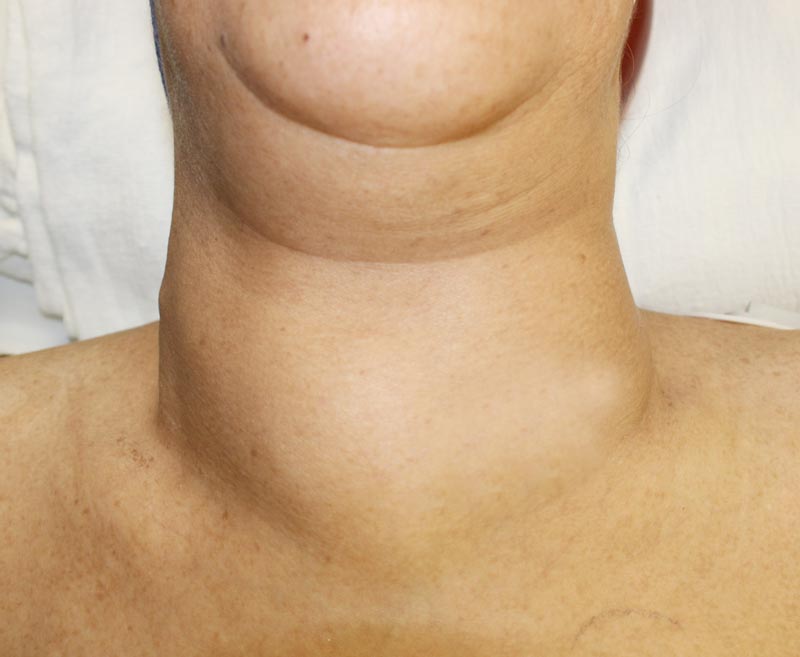What is a Goitre?
A goitre or goiter, is a swelling in the thyroid gland, which can lead to a swelling of the neck over the larynx (voice box).
Goitre is a term that refers to an enlargement of the thyroid (thyromegaly) and can be associated with a thyroid gland that may or may not be functioning properly.
A person with a goitre may have no symptoms of a thyroid disorder of may have an overactive or underactive thyroid condition.
Goitres associated with hypothyroidism or hyperthyroidism may be present with symptoms of the underlying thyroid disease – although the symptoms are often unspecific and hard to diagnose.
Thyroid symptoms may include weight loss despite increased appetite and heat intolerance.
Thyroid function
The recommended daily allowance of iodine for both men and women is 150 mcg, and for pregnant women 175 mcg is needed. A simple (euthyroid) goitre is usually the result of iodine deficiency (endemic goitre). A simple goitre that occurs in a non-endemic area is usually described as being sporadic.
A sporadic goitre may be due to an inherited familial tendency, poor diet, or certain foods (eg.cabbage) or medication (eg. carbimazole) which suppress thyroid function.
Goitre growth is variable. A simple goitre may disappear on its own. However, a goitre may continue to grow and stop making enough thyroid hormone – leading to hypothyroidism.
Occasionally, a goitre may become toxic and produce thyroid hormone on its own – this can cause high levels of thyroid hormone, a condition called hyperthyroidism.
Risk factors
- Age over 40 years
- Family history
- Female gender
- Not getting enough iodine in the diet
Thyroid symptoms caused by a Goitre
- A lump in the neck
- Problems with eating and drinking and speech
- The sensation of a lump in the throat
- Breathing problems
- Problems with metabolism due in association with an overactive or underactive thyroid condition
Goitre causes
Colloid goitres occur in groups of people who live in areas with iodine-poor soil. These regions are usually away from the sea coast. People in these communities might not get enough iodine in their diet – iodine is needed to produce thyroid hormone. In 2012 the use of iodized table salt prevents iodine deficiency. The Great Lakes, Midwest, and inner mountain areas of the United States were once called the “goiter belt” because many people developed goitres there.
Goitre belts are often mountainous regions where iodine has been leached out of the soil over many years. These goitre belts can be found in the Swiss Alps, the Rocky Mountains, the Andes, the Himalayas and the mountainous regions of Australia, New Guinea and New Zealand. Today a lack of iodine is still common in central Asia, the Andes region of South America, and central Africa. For most people with a sporadic goitre the cause is unknown. Other causes may include certain medications such as lithium or aminoglutethimide. Inherited causes may even be a factor.
Goitre treatment
Prevention may be achieved by maintaining a diet with adequate iodine. Once a significant goitre has developed surgery is often required to relieve pressure symptoms or for cosmetic reasons. When a goitre is causing pain, problems with eating and drinking or breathing, surgery is required. Surgery for a goitre may be needed as part of treatment for an overactive or underactive thyroid disorder. Surgery is also necessary where there is concern that a goitre may be cancerous.
If you have any questions about thyroid symptoms, you should speak to your local doctor, who will arrange to contact your thyroid surgeon.

